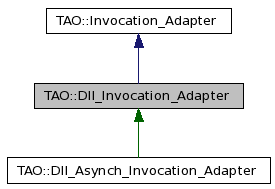
#include <DII_Invocation_Adapter.h>
Inheritance diagram for TAO::DII_Invocation_Adapter:


Definition at line 58 of file DII_Invocation_Adapter.h.
| TAO::DII_Invocation_Adapter::DII_Invocation_Adapter | ( | CORBA::Object * | target, | |
| Argument ** | args, | |||
| int | arg_number, | |||
| const char * | operation, | |||
| size_t | op_len, | |||
| CORBA::ExceptionList * | exception, | |||
| CORBA::Request * | r, | |||
| Invocation_Mode | mode = TAO_DII_INVOCATION | |||
| ) |
| target | Points to the object on which this invocation is being invoked. | |
| args | Array of pointers to the argument list in the operation declaration. this includes the return, inout and out arguments. | |
| arg_number | Number of arguments in the above array. This is the number of elements in the above array. | |
| operation | The name of the operation being invoked. | |
| op_len | Number of characters in the operation name. This is an optimization which helps us to avoid calling strlen () while creating a message format. | |
| mode | Invocation mode. This information is also available in the IDL file and in the generated code. |
Definition at line 30 of file DII_Invocation_Adapter.cpp.
00039 : Invocation_Adapter (target, 00040 args, 00041 arg_number, 00042 operation, 00043 op_len, 00044 0, // Collocation Proxy broker pointer 00045 TAO_TWOWAY_INVOCATION, 00046 mode) 00047 , exception_list_ (excp) 00048 , request_ (r) 00049 , ex_data_ (0) 00050 { 00051 }
| TAO::DII_Invocation_Adapter::~DII_Invocation_Adapter | ( | void | ) | [virtual] |
Definition at line 53 of file DII_Invocation_Adapter.cpp.
References ex_data_.
00054 { 00055 delete[] ex_data_; 00056 }
| TAO::DII_Invocation_Adapter::DII_Invocation_Adapter | ( | void | ) | [private] |
Dont allow default initializations.
| TAO::DII_Invocation_Adapter::DII_Invocation_Adapter | ( | const DII_Invocation_Adapter & | ) | [private] |
| void TAO::DII_Invocation_Adapter::invoke | ( | TAO::Exception_Data * | ex, | |
| unsigned long | ex_count | |||
| ) | [virtual] |
Invoke the target.
Reimplemented from TAO::Invocation_Adapter.
Definition at line 59 of file DII_Invocation_Adapter.cpp.
References ACE_NEW_THROW_EX, CORBA::ExceptionList::count(), ex_data_, and exception_list_.
00061 { 00062 // Convert DII exception list to a form the invocation can use 00063 // to filter raised user exceptions. 00064 ex_count = this->exception_list_->count (); 00065 ACE_NEW_THROW_EX (this->ex_data_, 00066 TAO::Exception_Data[ex_count], 00067 CORBA::NO_MEMORY ()); 00068 for (unsigned long l=0; l<ex_count ;++l) 00069 { 00070 CORBA::TypeCode_var xtc = this->exception_list_->item (l); 00071 this->ex_data_[l].id = xtc->id (); 00072 this->ex_data_[l].alloc = 0; 00073 #if TAO_HAS_INTERCEPTORS == 1 00074 this->ex_data_[l].tc_ptr = xtc.in (); 00075 #endif 00076 } 00077 00078 Invocation_Adapter::invoke (this->ex_data_, ex_count); 00079 }
| Invocation_Status TAO::DII_Invocation_Adapter::invoke_collocated_i | ( | TAO_Stub * | stub, | |
| TAO_Operation_Details & | details, | |||
| CORBA::Object_var & | effective_target, | |||
| Collocation_Strategy | strat | |||
| ) | [protected, virtual] |
Reimplemented from TAO::Invocation_Adapter.
Definition at line 82 of file DII_Invocation_Adapter.cpp.
References TAO_Operation_Details::cac(), and ACE_Dynamic_Service< TYPE >::instance().
00087 { 00088 TAO_DII_Arguments_Converter_Impl* dii_arguments_converter 00089 = ACE_Dynamic_Service<TAO_DII_Arguments_Converter_Impl>::instance ( 00090 "DII_Arguments_Converter"); 00091 details.cac (dii_arguments_converter); 00092 00093 return Invocation_Adapter::invoke_collocated_i (stub, 00094 details, 00095 effective_target, 00096 strat); 00097 }
| Invocation_Status TAO::DII_Invocation_Adapter::invoke_twoway | ( | TAO_Operation_Details & | op, | |
| CORBA::Object_var & | effective_target, | |||
| Profile_Transport_Resolver & | r, | |||
| ACE_Time_Value *& | max_wait_time | |||
| ) | [protected, virtual] |
Reimplemented from TAO::Invocation_Adapter.
Reimplemented in TAO::DII_Asynch_Invocation_Adapter.
Definition at line 100 of file DII_Invocation_Adapter.cpp.
References CORBA::Request::_tao_byte_order(), CORBA::SystemException::_tao_minor_code(), CORBA::COMPLETED_NO, TAO_Transport::messaging_object(), CORBA::OMGVMCID, TAO_GIOP_Message_Base::out_stream(), request_, ACE_OutputCDR::reset_byte_order(), TAO::Profile_Transport_Resolver::stub(), TAO::TAO_DII_INVOCATION, TAO::TAO_INVOKE_RESTART, TAO::TAO_TWOWAY_INVOCATION, TAO::Profile_Transport_Resolver::transport(), and TAO::VMCID.
00105 { 00106 // Simple sanity check 00107 if (this->mode_ != TAO_DII_INVOCATION || 00108 this->type_ != TAO_TWOWAY_INVOCATION) 00109 { 00110 throw ::CORBA::INTERNAL ( 00111 CORBA::SystemException::_tao_minor_code ( 00112 TAO::VMCID, 00113 EINVAL), 00114 CORBA::COMPLETED_NO); 00115 } 00116 00117 TAO_Transport* const transport = r.transport (); 00118 00119 if (!transport) 00120 { 00121 // Way back, we failed to find a profile we could connect to. 00122 // We've come this far only so we reach the interception points 00123 // in case they can fix things. Time to bail.... 00124 throw CORBA::TRANSIENT (CORBA::OMGVMCID | 2, CORBA::COMPLETED_NO); 00125 } 00126 00127 transport->messaging_object ()->out_stream ().reset_byte_order ( 00128 request_->_tao_byte_order ()); 00129 00130 TAO::DII_Invocation synch (this->target_, 00131 r, 00132 op, 00133 this->exception_list_, 00134 this->request_); 00135 00136 00137 Invocation_Status status = synch.remote_invocation (max_wait_time); 00138 00139 if (status == TAO_INVOKE_RESTART && 00140 (synch.reply_status () == GIOP::LOCATION_FORWARD || 00141 synch.reply_status () == GIOP::LOCATION_FORWARD_PERM)) 00142 { 00143 CORBA::Boolean const permanent_forward = 00144 (synch.reply_status () == GIOP::LOCATION_FORWARD_PERM); 00145 00146 effective_target = synch.steal_forwarded_reference (); 00147 00148 this->object_forwarded (effective_target, 00149 r.stub (), 00150 permanent_forward); 00151 } 00152 return status; 00153 }
| DII_Invocation_Adapter& TAO::DII_Invocation_Adapter::operator= | ( | const DII_Invocation_Adapter & | ) | [private] |
TAO::Exception_Data* TAO::DII_Invocation_Adapter::ex_data_ [private] |
Definition at line 119 of file DII_Invocation_Adapter.h.
Referenced by invoke(), and ~DII_Invocation_Adapter().
CORBA::ExceptionList* TAO::DII_Invocation_Adapter::exception_list_ [private] |
CORBA::Request* TAO::DII_Invocation_Adapter::request_ [private] |
 1.4.7
1.4.7